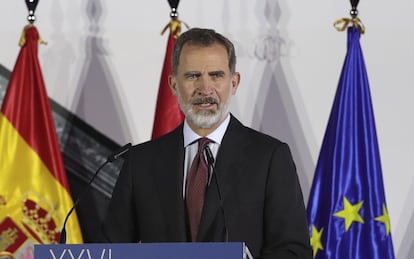Minister asks for probe of online chat where ex-army officials discuss ‘executing 26 million Spaniards’
The request by the defense chief comes after King Felipe VI was sent two letters by retired members of the military complaining about the ‘social-communist’ government and the threat to national unity

Spain’s Defense Minister, Margarita Robles, has sent prosecutors at the Madrid regional High Court information about a WhatsApp chat group in which retired military officials appear to show support for military uprisings and mass executions.
Robles is asking prosecutors to determine whether the messages exchanged by members of the 19th graduating class of the Air Force Academy constitute a crime “by individuals who additionally may have posed as members of the military in active duty service without being so,” said ministry sources.
The minister’s request is backed by information published on Wednesday by the online daily Infolibre, which reported two messages in the private chat group as stating the following: “There is no other choice but to start executing 26 million sons-of-bitches,” and: “What a pity not to be in active duty service in order to reroute a hot flight [carrying real ammunition] from Bárdenas [firing range] to the headquarters of those sons-of-bitches,” alluding to the separatist organization Catalan National Assembly (ANC), which played a leading role in the 2017 attempt at the Catalonia region’s unilateral secession from Spain. These two quotes have been attributed to Division General Francisco Beca Casanova and to Colonel Andrés González Espinar, respectively.

Although Robles did not mention any specific crime by name, her mention of retired individuals allegedly pretending to be in active duty service could conceivably lead to charges of impersonating an official, which carries prison terms of one to three years.
Prosecutors have replied with a request for further information before making a decision on whether to open an investigation. But sources consulted by this newspaper said it is unlikely that the complaint will get very far, because the remarks were made in a private chat group. Legal sources explained that if these officers were still in active duty service, they could be discharged for bad conduct and banned from using the uniform again, but this is not possible with retired officials.
The Chief of the Defense Staff, Air Force General Miguel Ángel Villarroya, has warned that the opinions of retired officials do not represent the armed forces, and only serve to hurt the latter’s public image. In a media release, Villarroya said that “the opinions of these individuals cannot be construed as representative of the community that they were once a part of, but should be viewed as the opinions of private citizens who have the right to express their views, but not to award themselves representation rights that they do not possess.”
Letters to the king
The individuals who participated in this chat group also signed a recent letter sent by retired members of the military to King Felipe VI, in which they railed against “the social-communist government” led by the Socialist Party (PSOE) in coalition with junior partner Unidas Podemos, which is “shored up by ETA-lovers and separatists,” alluding to a now-defunct Basque terrorist group and to Catalan pro-independence parties.
The letter, signed by 73 former army officials, said Spain’s national unity is at risk and showed support and loyalty for the king “during these difficult times for the homeland.” Days earlier, another group of 39 retired Air Force officials had sent Felipe VI a similar missive. Attempts at getting navy officials to join the initiative reportedly failed.
Robles spoke in Congress on Tuesday to criticize retired officials “who are trying to get the head of state involved” in their initiative, in violation of the political neutrality of the armed forces.
Lieutenant Colonel José Ignacio Domínguez, one of the participants in the WhatsApp chat group, on Wednesday told the Cadena SER radio network that back in March, “there began to be talk [in the chat group] about the possibility of a military uprising supported by the king,” styled after the failed coup attempt of February 23, 1981. But group members concluded that this was not a viable option, and suggested requesting a meeting with Felipe VI. In the end, the group settled for a letter, in the hopes of getting more officials to follow their lead.
Domínguez said that these initiatives are a result of tension created by the far-right party Vox, because “that kind of hatred had not existed before” within the group of retired officials.
Deputy Prime Minister Pablo Iglesias, the leader of Unidas Podemos, has played down the relevance of the statements. “What a few retired gentlemen might say in a chat group after too many drinks does not pose any kind of threat,” he said on Thursday during an interview with state broadcaster TVE. “If a few pro-Franco men think that they are doing the head of state a favor by surrounding him with Francoism, I think they fail to understand that what it’s really doing is making more Spaniards feel republican.”
Iglesias added that the letters put Felipe VI in “an absurdly uncomfortable situation” and that he will surely not even bother to read them.
English version by Susana Urra.
Tu suscripción se está usando en otro dispositivo
¿Quieres añadir otro usuario a tu suscripción?
Si continúas leyendo en este dispositivo, no se podrá leer en el otro.
FlechaTu suscripción se está usando en otro dispositivo y solo puedes acceder a EL PAÍS desde un dispositivo a la vez.
Si quieres compartir tu cuenta, cambia tu suscripción a la modalidad Premium, así podrás añadir otro usuario. Cada uno accederá con su propia cuenta de email, lo que os permitirá personalizar vuestra experiencia en EL PAÍS.
¿Tienes una suscripción de empresa? Accede aquí para contratar más cuentas.
En el caso de no saber quién está usando tu cuenta, te recomendamos cambiar tu contraseña aquí.
Si decides continuar compartiendo tu cuenta, este mensaje se mostrará en tu dispositivo y en el de la otra persona que está usando tu cuenta de forma indefinida, afectando a tu experiencia de lectura. Puedes consultar aquí los términos y condiciones de la suscripción digital.








































